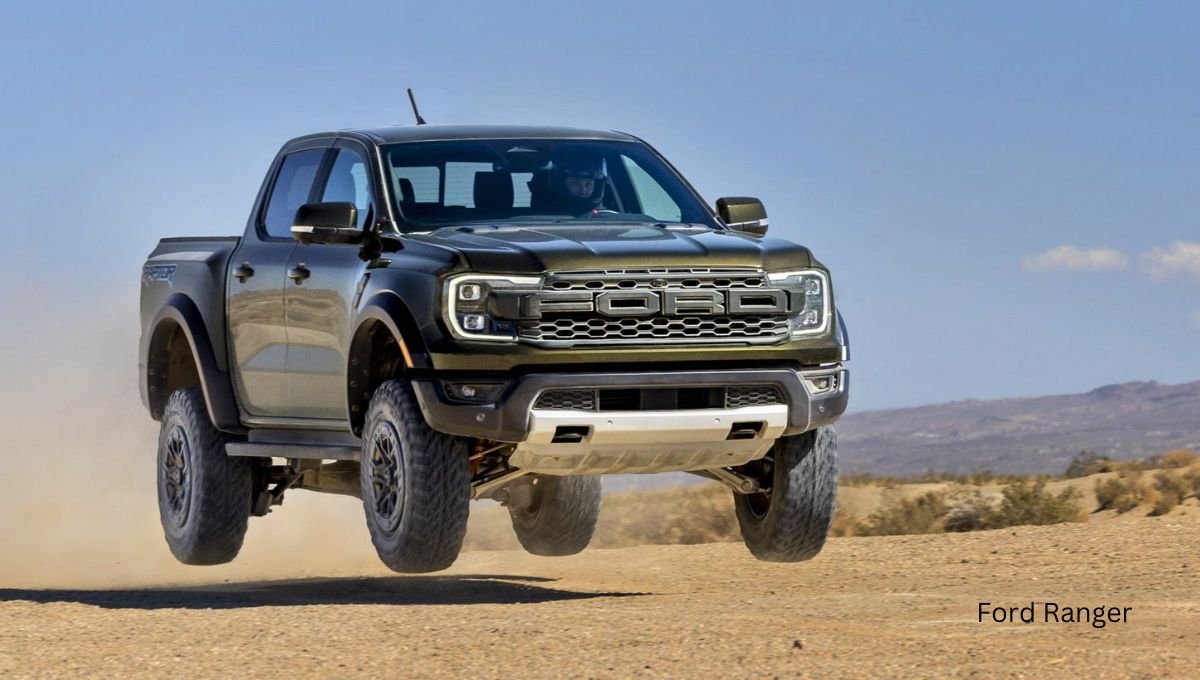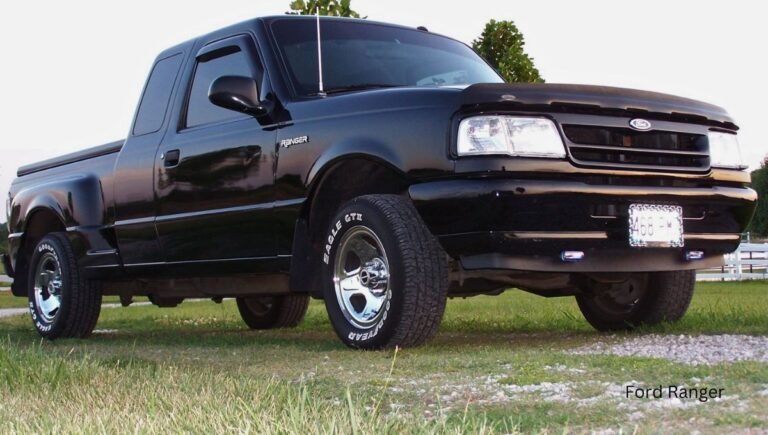How Much Does a Ford Ranger Weigh? Unveiling the Facts
The Ford Ranger weigh approximately 3,930 to 4,441 pounds. This midsize pickup truck offers a sturdy and reliable option for those seeking a vehicle with a manageable weight.
With its versatile capabilities and impressive hauling capacity, the Ford Ranger has become a popular choice among truck enthusiasts. Its weight range allows for efficient handling and fuel economy without compromising on power.
Whether you’re using it for work or recreation, the Ford Ranger’s weight ensures a balanced and controlled driving experience.
Experience the reliability and performance of the Ford Ranger, a truck that combines strength and maneuverability in one package.
Introduction To The Ford Ranger
The Ford Ranger’s weight varies depending on the model and features, typically ranging from 3,900 to 4,441 pounds. The weight can be affected by additional options and packages chosen by the buyer.

The Ranger’s Place In The Pickup Truck Market
The Ford Ranger, a popular midsize pickup truck, holds a significant place in the market due to its versatility and performance.
A Brief History Of The Model
The Ford Ranger has a rich history, initially introduced in the early 1980s as a compact truck.
Ford Ranger: Model Variations
The Ford Ranger is a popular choice for individuals and businesses alike, offering a versatile and reliable option for all kinds of drivers. However, when it comes to selecting the right model, understanding the various model variations is crucial.
From different generations to trim levels and configurations, each option has its own unique characteristics and features that cater to specific preferences and needs.
Different Generations And Their Characteristics
Since its debut in the 1980s, the Ford Ranger has evolved through different generations, each with its own advancements and improvements. From the compact early models to the more robust and modern versions, each generation boasts distinct features and capabilities.
Comparing Trim Levels And Configurations
When comparing the trim levels and configurations of the Ford Ranger, it’s important to consider the specific features and options available in each. From the basic XL trim to the more luxurious Lariat trim, each level offers a unique set of amenities and performance enhancements. Additionally, the various configurations, such as the SuperCab and SuperCrew, provide different seating and cargo options to suit individual preferences.
Key Factors Influencing Truck Weight
When considering a purchase or towing capacity, understanding the key factors influencing a truck’s weight is essential. The Ford Ranger, a popular midsize pickup, is no exception. Let’s delve into the key factors influencing the weight of the Ford Ranger.
The Role Of Vehicle Size And Structure
Vehicle size and structure significantly impact the weight of the Ford Ranger. Its compact dimensions contribute to a lighter overall weight, making it easier to handle and more fuel-efficient than larger trucks.
Impact Of Powertrain Options On Weight
The powertrain options available for the Ford Ranger play a crucial role in determining its weight. The choice between a gasoline or diesel engine, as well as the type of transmission, can significantly influence the overall weight of the vehicle.
Base Curb Weight Explained
Discover the base curb weight of a Ford Ranger, which typically ranges from 3,918 to 4,441 pounds. This weight includes the vehicle’s standard equipment and a full tank of fuel, providing an insight into the model’s overall mass.
Definition Of Curb Weight
Curb weight refers to the weight of a vehicle without any passengers, cargo or additional equipment. It is the weight of the vehicle as it would be driven off the lot after the manufacturer has installed all standard equipment, including the necessary fluids for operation. It does not include the weight of any optional accessories or equipment that may be added by the dealer or owner.
How Curb Weight Affects Performance And Efficiency
The curb weight of a vehicle plays a significant role in its performance and efficiency. The heavier the vehicle, the more power it needs to move, resulting in lower fuel efficiency. On the other hand, a lighter vehicle requires less power to move and thus has better fuel efficiency.
A vehicle’s curb weight can affect its handling and braking, as heavier vehicles require more force to stop and may be more difficult to maneuver.
The base curb weight of a Ford Ranger is the weight of the vehicle without any optional equipment or accessories. It includes the weight of the standard equipment, such as the engine, transmission, and fuel tank.
The base curb weight can vary depending on the model and trim level of the Ford Ranger. For example, the 2021 Ford Ranger XL SuperCab has a base curb weight of 4,145 pounds, while the 2021 Ford Ranger Lariat SuperCrew has a base curb weight of 4,441 pounds.
In conclusion, understanding the base curb weight of a vehicle is essential when choosing the right vehicle for your needs. The curb weight affects the vehicle’s performance, efficiency, handling, and braking, so it’s important to consider this factor when making your decision.
If you’re in the market for a Ford Ranger, knowing the base curb weight of the different models and trim levels can help you make an informed decision.
Average Weight Of The Ford Ranger
The Ford Ranger’s average weight ranges from 4,145 to 4,441 pounds, depending on the model and features. This midsize pickup truck is known for its sturdy build and impressive hauling capacity, making it a popular choice for various driving needs.

The Ford Ranger is a popular midsize pickup truck known for its durability and versatility. One important factor to consider when purchasing a truck is its weight, as it can impact fuel efficiency, towing capacity, and overall performance. The average weight of the Ford Ranger varies depending on the model and configuration.
Weight Range Across Different Models
The Ford Ranger comes in several different models, each with its own weight specifications. Here is a breakdown of the weight range across different Ford Ranger models:
| Model | Average Weight (lbs) |
|---|---|
| Ford Ranger XL | 3,996 – 4,441 |
| Ford Ranger XLT | 4,069 – 4,441 |
| Ford Ranger Lariat | 4,345 – 4,441 |
Please note that these weights are approximate and can vary depending on additional features and options.
Comparisons With Competitor Trucks
In comparison to its competitors in the midsize truck segment, the Ford Ranger generally falls within a similar weight range. Here are some weight comparisons with popular competitor trucks:
- Toyota Tacoma: The Ford Ranger is slightly lighter than the Toyota Tacoma, which has an average weight range of 4,050 – 4,480 lbs.
- Chevrolet Colorado: The Ford Ranger and Chevrolet Colorado have comparable weight ranges, with the Colorado weighing between 3,985 – 4,550 lbs.
- Nissan Frontier: The Ford Ranger is generally lighter than the Nissan Frontier, which weighs between 4,260 – 4,735 lbs on average.
It’s important to note that weight is just one aspect to consider when comparing trucks. Factors such as engine power, payload capacity, and towing capability also play a significant role in determining a truck’s overall performance.
In conclusion, the average weight of the Ford Ranger varies depending on the model and configuration. It falls within a similar weight range as its competitors in the midsize truck segment. When choosing a truck, it’s essential to consider various factors to ensure it meets your specific needs and preferences.
Optional Features And Their Weight Add-ons
Optional features and their weight add-ons can significantly impact the overall weight of a Ford Ranger. Understanding how these optional features contribute to the total weight is essential for vehicle owners and enthusiasts alike.
How Accessories Influence Total Weight
Various optional accessories can be added to a Ford Ranger, each with its own weight implications. It’s crucial to consider the combined weight of these accessories when assessing the overall load capacity and performance of the vehicle.
The Impact Of Aftermarket Modifications
Aftermarket modifications, such as lift kits, off-road bumpers, and roof racks, can substantially increase the weight of a Ford Ranger. These alterations should be carefully evaluated, as they may affect the vehicle’s handling, fuel efficiency, and overall driving experience.
Weight Considerations For Towing And Payload
The weight considerations for towing and payload are crucial when determining how much a Ford Ranger weighs. Understanding the weight capacity of the truck is essential for safe and efficient towing and hauling operations. By evaluating the towing and payload capacities, drivers can ensure they stay within the recommended weight limits and avoid potential risks on the road.
Understanding Towing Capacity
Towing capacity is the max weight a vehicle can tow safely.
Ford Ranger’s towing capacity varies based on the model.
Calculating Payload Limits
Payload limit is the max weight a vehicle can carry in its bed.
To calculate, subtract the truck’s weight from its Gross Vehicle Weight Rating (GVWR).
Exceeding payload limits can lead to safety hazards.
Real-world Implications Of Truck Weight
The weight of a Ford Ranger varies depending on the model and the equipment it comes with. However, it is important to consider the real-world implications of truck weight, such as fuel efficiency, road safety, and potential damage to roads and bridges.
It is crucial to comply with weight regulations to ensure safe and sustainable transportation.
Fuel Economy And Weight Correlation
When Ford Ranger weight increases, fuel consumption typically goes up.
High truck weight can lead to decreased fuel efficiency.
The correlation between weight and fuel economy is significant.
Handling And Maneuverability
Heavier trucks may be harder to steer and control.
Lighter trucks generally offer better handling and agility.
Truck weight plays a crucial role in maneuverability.
In summary, truck weight impacts fuel efficiency and handling.
Conclusion
Knowing how much a Ford Ranger weighs is important for various reasons, such as ensuring you don’t overload it beyond its capacity or complying with road regulations. The weight of a Ford Ranger varies depending on the model, with the latest models weighing between 3,920 and 4,441 pounds.
Understanding the weight of your vehicle is crucial to keep it in good condition and ensure your safety on the road.







